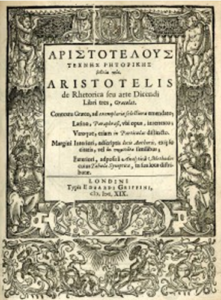 The main current meaning of rhetoric is “the art of using language effectively so as to persuade or influence others” (OED). But in ancient Greece and Rome rhetoric was an important component of education, part of the curriculum known as the trivium—grammar, rhetoric, and dialectic (logic). In this sense it was elegantly defined by Margaret Howatson, in The Oxford Companion to Classical Literature, as “oratory that can be reduced to a system which can be taught” and it consisted of five components: invention (the discovery of the relevant material), arrangement (putting it together in a structured fashion), diction (the appropriate method of delivery), memory, and delivery. Just like giving a lecture.
The main current meaning of rhetoric is “the art of using language effectively so as to persuade or influence others” (OED). But in ancient Greece and Rome rhetoric was an important component of education, part of the curriculum known as the trivium—grammar, rhetoric, and dialectic (logic). In this sense it was elegantly defined by Margaret Howatson, in The Oxford Companion to Classical Literature, as “oratory that can be reduced to a system which can be taught” and it consisted of five components: invention (the discovery of the relevant material), arrangement (putting it together in a structured fashion), diction (the appropriate method of delivery), memory, and delivery. Just like giving a lecture.

In Greek the adjective ῥητορική was used as a noun, as shorthand for ῥητορικὴ τέχνη (Latin ars rhetorica), the art of rhetoric. It was considered so important that many classical authors wrote textbooks on it and the related subject of oratory, including Aristotle (picture), Cicero, Dionysius of Halicarnassus, Quintilian, and Tacitus.
The trivium, combined with the quadrivium—arithmetic (pure number), geometry (number in space), music (number in time), and astronomy (number in time and space)—gave a perfect grounding in the liberal arts, as outlined by Plato in The Republic, and an excellent preparation for the study of philosophy and the practical arts, such as medicine and architecture. We are now beginning to recognise the importance of this in education, with the addition of oracy, the ability to speak and communicate clearly, to the traditional forms of learning—literacy (reading and writing) and numeracy (arithmetic).
In the wake of this week’s turbulent political events, I have been reading and listening to recordings of the victory speeches of recent American Presidents, noting many similarities. Near the beginning of the speech the new President elect usually comments on receiving a call from his opponent, the call generally, although not always, being described as “gracious”. Thanks are offered to all and sundry, including family members, and each proclaims that his wife will be a great First Lady, perhaps the best ever. Other common themes include expressions of unachievable hopes and aspirations. A desire for national unity often features, as in the following extracts from a range of such speeches.
“That will be the great objective of this administration at the outset—to bring the American people together.” Richard Nixon, 1968.
“One of the very first tasks facing any new President is the unification of our country after a close and hard fought election” Jimmy Carter, 1976.
“A campaign is a disagreement, and disagreements divide, but an election is a decision, and decisions clear the way for harmony and peace, and I mean to be a President of all the people.” George H W Bush, 1988.
“. . . and perhaps most important of all, to bring our people together as never before, so that our diversity can be a source of strength in a world that is ever smaller, where everyone counts and everyone is a part of America’s family.” Bill Clinton, 1992.
“[Vice President Gore and I] agreed to do our best to heal our country after this hard fought contest . . . I know America wants reconciliation and unity.” George W Bush, 2000.
“Let us resist the temptation to fall back on the same partisanship and pettiness and immaturity that has poisoned our politics for so long. Let us remember that it was a man from this state who first carried the banner of the Republican Party to the White House—a party founded on the values of self-reliance, individual liberty, and national unity.” Barack Obama, 2008.
“Now it’s time for America to bind the wounds of division. We have to get together. To all Republicans and Democrats and Independents across this nation, I say it is time for us to come together as one united people. It’s time.” Donald Trump 2016.
Many other comparisons are possible. Politics is politics. And rhetoric is rhetoric.
Jeffrey Aronson is a clinical pharmacologist, working in the Centre for Evidence Based Medicine in Oxford’s Nuffield Department of Primary Care Health Sciences. He is also president emeritus of the British Pharmacological Society.
Competing interests: None declared.
